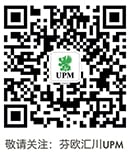When a company has sustainability at the core of its business – as UPM does – that means a commitment to transparency along the entire length of the supply chain. But when you have some 24,000 suppliers in 75 countries, it's challenging to review and audit them all on your own. This is why we have joined a Together for Sustainability (TfS) initiative including a network of more than 20 companies heavily involved with chemicals in their production.
TfS initiative provides verified information to all its member companies about the performance of chemical suppliers related to environment, labor, human rights, ethics, procurement and more. However, before being listed in the TfS, the data given by suppliers is assessed and scored by EcoVadis who provides business sustainability ratings, intelligence and collaborative performance improvement tools for global supply chains.
As we're all involved with the chemical industry in one way or another, there is often overlap between the pools of suppliers we work with. So sharing this verified information simply makes sense. It's a far more efficient way to conduct supplier risk assessments than working alone.
But it's not just the member companies of TfS that benefit from being part of the initiative; there are massive scale advantages for suppliers, too. By filling in a standardised questionnaire only once, a supplier's answers are immediately visible to all the other TfS members. This not only reduces the workload for suppliers, it's also a form of marketing for their business.
The other dimension to being part of TfS is that, based on the assessment results, we can easily identify the raw material suppliers for which we want to conduct an on-site audit - our most thorough risk assessment. Through TfS, we have access to an external pool of competent and qualified auditors who can conduct the on-site audits for us. Once the audit report is completed, it is together with the EcoVadis assessment visible to the other TfS members, too.
I want to conclude with an important point: all this is not about finger pointing and repercussions – it's about helping suppliers to develop. If we spot suppliers with low responsibility scores, then with their agreement we work together to plan a path to improvement. Sometimes this may mean enhancing workplace safety arrangements, other times it may be environmental, or social. Whatever the case, it often requires time and investment from both sides. But this is UPM's ultimate goal: supplier development.
Blog post by Nina Norjama, Director, Social responsibility at UPM. This post was originally published on TfS website on 17th January 2020.
